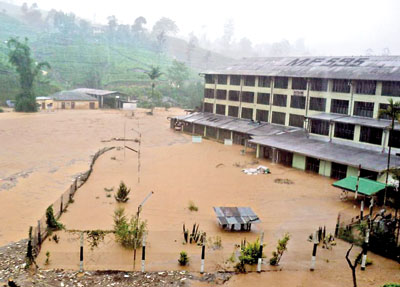News
Unauthorised building caused fatal floods that submerged Hatton-Dickoya
Family swept to their deaths, graveyard corpses exposed by seven-foot torrent
Seven-year-old Amritha had returned from school and was having her lunch when floodwaters suddenly broke through her home in Hatton-Dickoya, sweeping the little girl to her death – a fatality blamed by the authorities this week on uncontrolled development in the area.
The tragedy occurred when heavy rains lasting more than four hours submerged the entire town. Killed along with Amritha on May 13 were her grandmother, Sivapakkiyam, and her aunt, Kamaleswary. The little girl’s uncle had dropped her off at home and gone out again to pick up her sister from school. In that time the rain and the rising waters of the Dickoya- Keselgamuva river sent floods seven feet high sweeping through the town.

A scene from Dickoya
Torrential rain – 255mm was recorded – had been falling on the town for four hours from 1.30pm, causing floods that sent the town under water for the first time in memory. The floods have displaced about 3000 people and destroyed more than 200 houses. Most of the residents in Hatton are engaged in poultry farming, and the floods have washed away their livestock, including cattle and goats, along with other belongings.
Parapet walls of big shops and buildings collapsed with the floodwater moving at high speed, like a river through the town. Parts of the collapsed walls blocked drains, preventing the outflow of water. Dead bodies from the Hatton cemetery became exposed as the floods washed away earth from the gravesites.
Ariyagama, Kudagama and Gaminipura were the areas most affected in the urban council area, but other areas in the Hatton district, such as Watawala, Norwood, Swamymalai and Nawalapitiya had also experienced problems. The Hatton bus depot was severely damaged.
Hatton-Dickoya Urban Council Chairman A. Nandakumar said the floods had caused Rs. 100-200 million worth of damage to the local population, and Rs. 9 million worth of damage to council property. Rs.14 million would be needed for de-silting and widening the Dickoya, Darawala and Kesalgamuva rivers.
Mr. Nanadakumar told the Sunday Times that the corpses in the graveyard had become exposed because the cemetery parapet walls had been demolished by the Road Development Authority in widening the road, leaving the soil inside to be swept away by the floods. He stressed that he had written several times to the RDA requesting that new walls be built.
“We have taken temporary measures to cover up the exposed bodies,” he said. Flash floods in the past had not affected the area as badly as this. Twenty years of unauthorised business and residential building had caused this tragedy, Mr. Nandakumar said.
He said culverts had been indiscriminately blocked and closed to facilitate the construction of an increasing number of business premises in the Hatton-Dickoya area. There were 3500 residential and 5900 commercial premises.
The Urban Council has been filing cases against such illegal constructions and had sometimes acted to demolish them, the council chairman said. He said Indian-origin entrepreneurs from Colombo had donated money to help people affected by the floods. Displaced people are receiving emergency shelter at the Abusali Hall, Dickoya School and the local railway station.
The Disaster Management Centre in Hatton has provided these people with food and clothing for three days (May 13-15) but this “is not enough to fulfil people’s needs”, Mr. Nandakumar said. The urban council has appointed a nine-member committee including RDA engineers and a geographical specialist to examine the reasons for the flooding and take precautions for the future.
Monsoon settling in for next four months
The south-west monsoonal rains will settle in by next week and continue until mid-September, the Meteorological Department said.
The change marks the end of the hot weather.
“Rains in the south-west have already begun,” department Director, S.R Jayasekera, said. “If any disturbance forms in the Bay of Bengal, showery and windy weather will increase.”The Western, Central and Sabaragamuwa provinces and the districts of Galle and Matara will receive monsoonal rain, and windy weather could be expected almost all over the country, he said.
Asked if cyclones could be expected, Mr Jayasekera said these could occur in the Bay of Bengal yet not cross over Sri Lanka, but the country would experience extra winds and showers at such a time.
Follow @timesonlinelk
comments powered by Disqus

